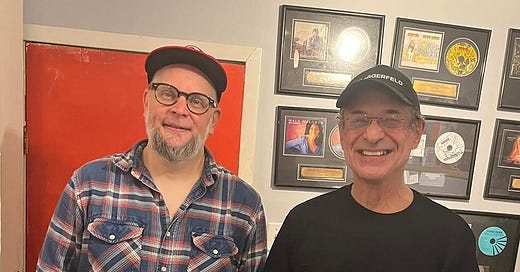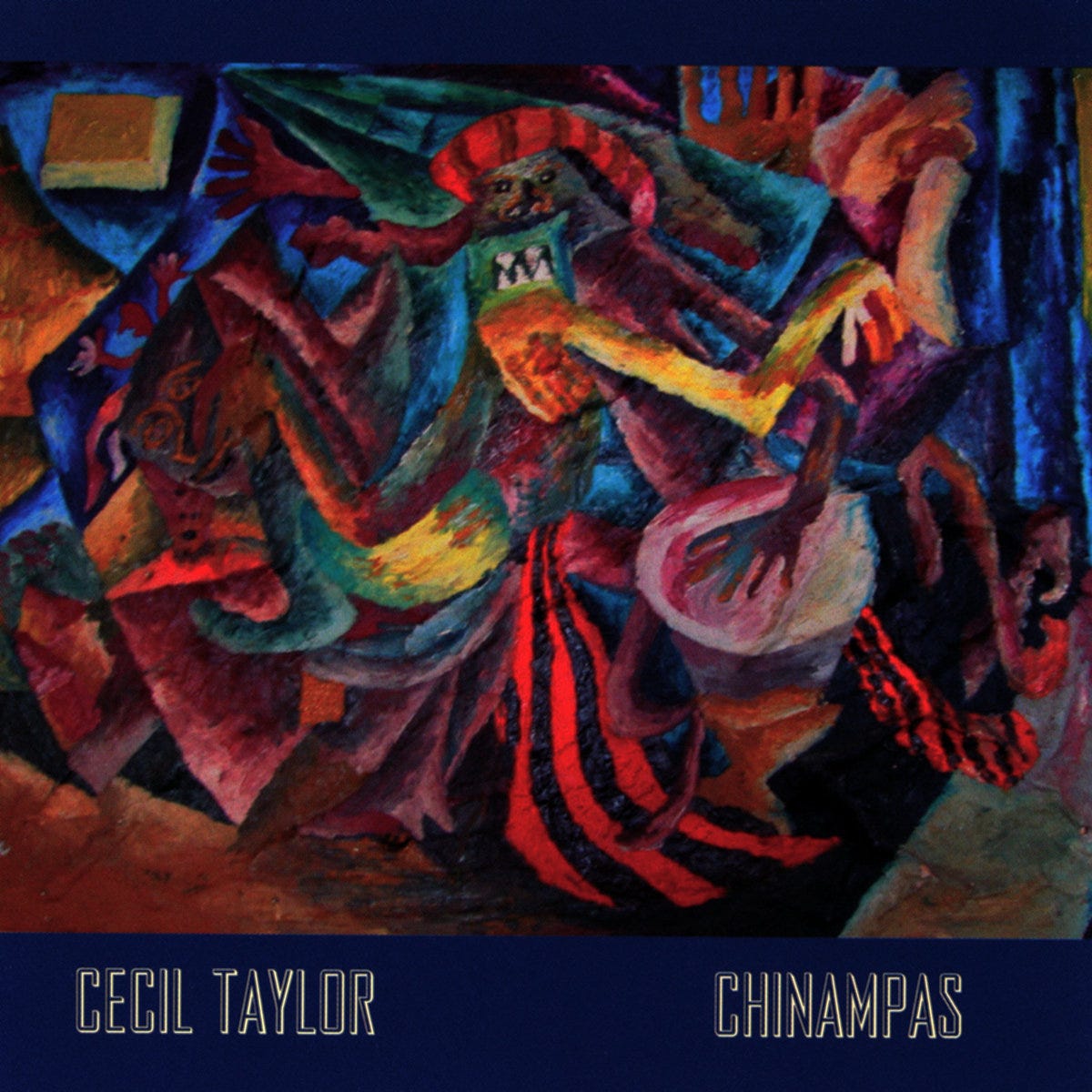Did you know Ivo Perelman was the last artist to release music on the legendary ’80s and ’90s label Homestead Records? It’s true! His album Cama de Terra, with Matthew Shipp on piano and William Parker on bass, was released on Homestead in 1996, co-produced by the financially troubled label’s then-manager, Steven Joerg, who would go on to found AUM Fidelity Records the following year.
I found a copy of Cama de Terra in the promo CD box at an alt-weekly I was writing for back then. I’ve been listening to Ivo Perelman’s music ever since. And when I decided to launch Burning Ambulance Music in 2021, he was one of the first artists I reached out to. He donated a duo track with trumpeter Nate Wooley to Eyes Shut, Ears Open, the digital-only compilation that was our first release, and then we decided to release the entire session as Polarity.
Polarity was very well reviewed; Jazziz called it “an absorbing and dynamic set of improvisations”, while The Wire described it as “the sound of people figuring out what they can do together”, and DownBeat praised its “articulate expressions of spontaneous communication”.
Two years later, Perelman and Wooley reunited and released Polarity 2, which The Wire called “a series of reflective, sometimes ludic, conversations”, while the Free Jazz Blog described the two men as “two familiar comrades meeting up after a short time apart, each with something to say, and the other more than willing to listen and respond”, and Something Else! said, “Ivo Perelman and Nate Wooley once again push each other to peak performances, and since their peaks are high, so is the level of improvisation.”
Now the third installment has arrived. Polarity 3 is as intimate and beautiful as each of its two predecessors; The Wire praises it as “a mostly bucolic, thoughtful exploration of instrumental counterpoint, with hints of tradition...but mostly spare and abstract”, while Big Takeover says the music “sounds like two pals wandering down the same path, each veering off the edge to check out the foliage, but always coming back together.”
Here’s an excellent review of Polarity 3, and our other new release, Tungu’s Irrational Thinking of the Subject, from Jazz Sketches:
Each volume in this series is fantastic, but taken together they add up to a major artistic statement. That’s why we’re offering a special deal, available on each of the individual albums’ Bandcamp pages: all three CDs for just $35 plus shipping. (Plus, I’ll throw a bonus CD into the package.)
Head to Bandcamp and dive into these two brilliant improvisers’ work.
Cecil Taylor released four albums on Leo Records, all recorded in 1987. Two were full band performances, Live in Vienna and Live in Bologna. Those will be reissued in the near future; stay tuned. Another, Tzotzil/Mummers/Tzotzil, combined a live musical performance with studio recordings of Taylor reading his poetry. And the fourth, Chinampas, stands alone in Taylor’s discography as an entire album of his unique and fascinating poetry, only intermittently accompanied by hand-held percussion.
David Grundy wrote an essay, “‘everything that you do’: On the Poetry of Cecil Taylor”, which can be read here. In it, he explores Taylor’s whole history with poetry, and the avant-garde cultural milieu in 1950s and 1960s New York. In my book In the Brewing Luminous: The Life & Music of Cecil Taylor, I also discussed that history, and wrote about Chinampas in particular, saying:
Chinampas was recorded on November 16 and 17 at the oddly but aptly named Doodlehums Studio in London, and consists entirely of poetry. Taylor does not touch the piano at any point, though he does occasionally strike or rattle one or another hand-held percussion instrument (a small gong, a shaker), and during two pieces, he rustles sheets of paper ostentatiously. Do they contain the text he’s reading? It’s impossible to know; it may just be a theatrical effect. In the videos which exist of his poetry readings, he never does anything like this.
The album contains nine untitled tracks, of which the shortest is 3:36 and the longest 12:30. (The poem which opens Tzotzil Mummers Tzotzil is heard again here, the next-to-last track.) He performs in a variety of voices, including a dramatic whisper, a kind of mid-Atlantic or mock-British accent, and a dry sardonic croak that sounds remarkably like the late Beat author William Burroughs delivering one of his cynical imprecations against American society. Sometimes he is heard reading two poems at once; sometimes he devolves into pre- or post-verbal murmurs, screeches, gasps and yelps.
It is worth listening to Chinampas, because of the relationship between Taylor’s writing, and his reading of that writing, and his compositional and improvisational style at the piano. They are very similar. Taylor delivers his lines with the same clipped precision he exercises at the keyboard — where he eschews the sustain pedal in order to give each note the respect it deserves — and the words fly by almost as fast as the notes. When he slows down, it is possible to hear melodies in his poetry that echo those in his music, and he will fixate on a certain phrase, repeating it two or three times with slight variations, just as he repeats his cell-like melodies before leaping into improvised extrapolation. When he distorts the words, turning them into growls or yelps, it’s similar to the way he slams the keyboard with his entire hand, or even his entire forearm.
Poet and critic Fred Moten writes of Chinampas, “A poetry, then, that is of the music; a poetry that would articulate the music’s construction; a poetry that would mark and question the idiomatic difference that is the space-time of performance, ritual, and event; a poetry, finally, that becomes music in that it iconically presents those organizational principles that are the essence of music.” When discussing the recordings with Chris Funkhouser [link], Taylor averred that his vocal performances had been improvised, unrehearsed — that he had chosen in the moment how to present these lines. And that is audible when one listens; it’s possible to hear him thinking, considering his next gambit between breaths.
Taylor’s poetry is not meant to be understood in the conventional sense. Like his music, individual phrases catch the listener’s attention, but they go by too fast for reflection. It’s only upon repeated listening that they can be plucked out of the flood of information and examined, and at that point it becomes clear that while any given poem, as a completed work, will contain references to Taylor’s interests — botany and natural science, indigenous civilizations of South America, architecture — the individual lines are constructed in a manner meant to be aurally pleasing rather than directly communicative. Again, just like the notes he plays.
Edgard Varèse said that music is organized sound. When Cecil Taylor is reading/reciting/performing a poem, it’s organized sound. The words are reduced to the sum of their phonemes, as a melody is revealed to be the sum of its component notes. Listen to Chinampas the way you would listen to Air Above Mountains or any other solo Taylor performance: as a flood of sounds. Mark the ones that captivate you, and recall them at leisure.
Buy Cecil Taylor’s Chinampas on the Leo Records Bandcamp page.
That’s it for now. See you next week!







Taylor's poetry, or should I say the presentation of it, before a musical performance always gave me chills. It seemed to herald that something special was coming, especially when the poetry would overlap with some initial, tentative, pecks at the piano.